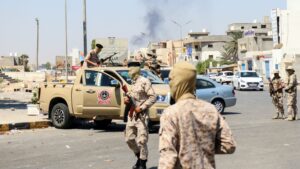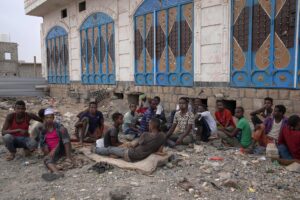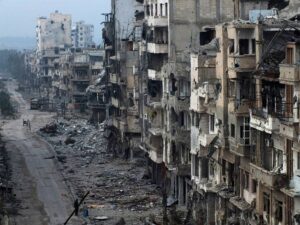
The National Interest Foundation Newsletter
Issue 203, August 25, 2023
Welcome to our NIF Newsletter. In this week’s headlines: we analyze the underlying causes and consequences of the recent clash between two militias in Tripoli, investigate the Human Rights Watch report on the violence face by Ethiopian migrants at the hands of Saudi border guards, and examine the growing risk of Syria becoming a failed state.
Written by Jacob Van Veldhuizen
Tensions High in Tripoli

The clash between two militias in Tripoli highlights the fragility of the peace in Libya. (Photo from Reuters)
Fighting in Tripoli Highlights Tense Situation in Libya
A recent clash in Tripoli between the 444 Brigade and the Special Deterrence Force (SDF) is indicative of a larger trend in Libya right now. The relative peace that has fallen over Libya in the past months is extremely fragile. Heavy fighting that broke out between the two groups led to the death of at least 55 people and the injury of 146 people. This fighting was triggered after the SDF took Colonel Mahmoud Hamza, the head of the 444 Brigade, captive. The fighting ended after an agreement was mediated by a local council to hand Hamza over to a neutral party, where he was eventually handed back to the 444 Brigade. It is of note that Hamza used to be a member of the SDF before defecting and forming the 444 Brigade.
At ground level, this conflict looks like a turf war. The SDF controls Tripoli’s Mitiga Airport, where Hamza was attempting to travel from. Fighting soon broke out between elements of the SDF and 444 Brigade. These two groups are the two largest militias in Tripoli and have swathes of territory that they control. However, when looking at this conflict within the context of Libyan politics, it becomes an indicator of a wider sense of instability in Libya. No agreement on elections has been made. Faith in the reunification process is declining and many groups are working to solidify their positions of power. This incident in itself is evidence that the current institutions in place are having difficulty controlling the various militias. This growing sense of instability increases the risk of more groups engaging in similar clashes and sending Libya back into chaos.
The unfortunate truth is there is a current lack of political will to create a unity government. Multiple groups do not want elections, as it will diminish the power they have accumulated since the NATO-backed overthrow of Muammar Gaddafi in 2011. Many of these groups are currently beholden to only themselves. This creates an environment of controlled anarchy.
There is also the ever-constant risk of Libya splitting into two entirely separate states. Currently, this route remains unlikely but still possible. A growing number of Libyans are beginning to see The Government of National Unity, led by Prime Minister Abdul Hamid Dbeibeh, as inadequate. The other major institution, the 5+5 Council, though extremely important in maintaining peace between the opposing sides, lacks any real power to affect stalled negotiations.
One viable path forward for Libya is to hold legislative and presidential elections separately. A majority of the disagreements on election rules are related to the presidential elections. Allowing the legislative elections to be held separately would allow the formation of a more representative government than the current institutions in place. This would also increase confidence in the democratization process and could reduce the chance of conflict. It is important to consider that even with an agreement on terms, legislative elections may still prove to be difficult to hold. Multiple groups would lose power if the election were to take place. These groups would likely use violence and intimidation to influence or otherwise delay the vote. This issue is difficult to combat without a united military, however, monitors from the United Nations could be used to ensure fairness during the election.
International support is essential to this process, but there are issues with this as well. Many external actors value stability over democracy in Libya. This short-sighted mindset has plagued foreign policy decisions for decades. History proves that installing a leader only leads to the guise of stability. Only with inclusive democracy can true long-term stability be achieved. Quick fixes, like the installation of a new leader of the Government of National Unity, would not solve the issue, but rather act as a temporary patch without addressing the real problem. There is a desperate need for a representative national unity government.
There is no magic bullet solution for Libya. The slowing of the political process is the most important problem to rectify at this time. It is important that the High State Council and House of Representatives approach negotiations for different elections separately and not as an all-or-nothing ordeal. This will allow the chance of legislative elections and a more representative government with a better ability to reign in the militias in Libya.
Ethiopian Migrants Killed

Ethiopian migrants have faced horrific violence on the border between Yemen and Saudi Arabia according to a new HRW report. (Photo from AP)
Ethiopian Migrants Being Killed by Saudi Border Guards According to HRW Report
A recently released report by Human Rights Watch (HRW) detailing accusations of Saudi forces using explosive weapons and small arms to repel unarmed Ethiopian migrants attempting to cross the border between Yemen and Saudi Arabia. Estimates put the number of people killed in these attacks anywhere from hundreds to thousands of migrants. This does not include those who survived with debilitating injuries, including some cases where limbs needed to be amputated. The report also included descriptions of the attacks. One particularly gruesome account details how after firing on a group of migrants, the Saudi border guards forced the men to rape the female migrants. The migrant who refused was shot and killed on the spot. There are also stories of as many as 150 people being killed in a single incident.
As situations continue deteriorating in Ethiopia, many migrants are forced to migrate to Saudi Arabia to escape poverty and human rights abuses. Many take a dangerous route known as the “Eastern Route.” This route runs from the Horn of Africa, across the Gulf of Aden, and through Yemen to Saudi Arabia. Migrants have described their journey as being rife with abuse from the smugglers and traffickers that control the route. This includes extortion, indentured servitude, slavery, rape, and physical and mental violence. Houthi forces, who control the areas along the border where migrants attempt to cross, are also involved. They control refugees’ movements and practice arbitrary migrant detention, torture, and human trafficking.
Saudi officials have rejected the accusations that these killings were systematic or large-scale despite the mountains of video evidence and eyewitness testimony supplied in the report. Testimony was corroborated by analysis of verified, geotagged videos posted on social media and sent directly to HRW Experts at the United Nations have said they received accusations of Saudi security forces employing identical tactics against migrants to the ones described in the HRW report.
The release of this report comes at an awkward time for Saudi Arabia. Riyadh has spent billions of dollars and considerable effort to enact strategies such as sportswashing to improve its perception among the international community. Notable instances include the creation and the LIV tour and its recent merger with PGA, the purchase of multiple soccer teams, and the hosting of entertainment events. This is all done to detract from past and current human rights abuses the country is responsible for. This campaign has increased in intensity as of late as Riyadh looks to cement its position in the Middle East and the region continues through a transitional period in regional politics.
It is unlikely that this report will significantly alter the US’s relationship with Saudi Arabia. Especially with an upcoming election, the Biden administration is not looking to upset an oil-producing country. Economic conditions have consistently been the deciding factor in the election of political leaders, particularly the president. The ongoing US-brokered Saudi-Israeli normalization negotiations also give Washington little room to criticize Saudi Arabia. Among other motivations, Biden is looking to improve the perception of the US’s involvement in the Middle East after the chaotic withdrawal from Afghanistan in 2020. Israeli leaders have also pushed the United States to do whatever is necessary to facilitate normalization.
Saudi Arabia is in a very advantageous position in negotiations and is making every effort to capitalize on this. Current Saudi demands for normalization with Israel include a security guarantee and help in developing a civilian nuclear program.
Saudi Arabia continues to act with such belligerence because of the lack of consequences. The apathy of America and Saudi Arabia’s growingstranglehold on oil production has allowed them to act with impunity. Past instances of human rights violations, including the brutal murder of Jamal Khashoggi, have brought only minor condemnation and no concrete action from the United States. The potential of a NATO-like defense agreement between Saudi Arabia and the United States would only solidify the feelings of impunity.
Syria Heading Towards Failed State Status

A brutal authoritarian regime coupled with the multiple natural disasters has pushed Syria to the brink. (Photo from Reuters)
After Over 12 Years of Fighting in Syria, there are No Winners
This year marks the 12th year since the brutal repression of a popular uprising in Syria sparked a devastating civil war in Syria. Bashar Al-Assad’s reentry into the Arab League which isolated him after his horrific attack on unarmed civilians has been seen as a political victory for the authoritarian leader. The facts on the ground are slightly different. Despite years of bombing, a massive earthquake, and the cutting off of aid routes, there are still areas in Northern Syria that Assad’s regime does not control. This combination has, however, led to acute suffering in the region. It has created two very different areas in Syria. The rebel-held area is rife with destruction. There is little food, clean water, or material to rebuild. The necessities that are available are far too expensive for most to afford. The government-held areas are better off than the rebel-held areas. However, with rising prices, food and fuel shortages, and a corrupt, authoritarian government, the situation is very fragile for some and downright grim for others.
Syria is rapidly approaching failed state status. The population of Syria in both the rebel and government-held parts are suffering and the government is both unable and unwilling to remedy the causes. The UN estimated in January 2023 that 55% of the people in Syria were food insecure. This has surely increased due to the spike in food prices after the earthquake in February. The price of basic goods has inflated by 100% while the Syrian currency’s value has dropped by 99%. On top of the earthquake and the inflation, Syrians have been suffering from an outbreak of cholera due to polluted drinking water. The outbreak affected 60,000 people across the country.
The earthquake offered Assad an opportunity to emerge from isolation. He leveraged his people’s suffering for political gain. Countries such as Jordan, Egypt, Saudia Arabia, and Oman all sent much-needed aid to Syria. The only issue is that very little of this aid made it to the people who needed it. The earthquake also allowed Assad to demonstrate its legitimacy. The United Nations international aid system is designed to provide assistance to governments. They are ill-equipped to offer that aid in the areas outside of the government’s control. Assad has purposefully exploited this situation as a cruel form of warfare in the rebel-held areas. If he cannot beat them militarily, he will instead starve them out. Assad seems willing to burn the country and all inside to rule over the ashes.
During his time in exile from the international community, Assad and those close to him set up a network to produce and trade illicit products, including drugs like Captagon and meth. He used this to fund his war and keep himself and those he needed to stay in power comfortable enough to remain loyal. This, coupled with the erosion of social connections due to the immense hardship, has created the perfect breeding ground for crime. Rising crime rates are a growing problem that will only continue to get worse and compound the suffering in Syria.
Syria has suffered through war, earthquakes, cholera, food and fuel shortages, rising crime, and a corrupt, authoritarian government. The culmination of these things has pushed Syria to its breaking point. The government is not providing for its people and continues to enforce a repressive regime. Despite all of this, the Syrian people’s spirit has not yet been broken. Unfortunately, spirit cannot stop a country from becoming a failed state. Assad rules through fear and violence, but this only creates the illusion of stability. The situation is likely to continue to deteriorate. There is no reprieve on the horizon for the Syrian people. It is essential for aid to reach all those who need it in Syria, but the means to do this remain elusive. Assad continues to control the flow of aid. All other flows have been cut off by Assad’s ally, Russia, in the United Nations. This creates a near-impossible situation for international institutions to provide the aid many Syrians so desperately need. Every possible solution must be explored and attempted. Without a solution in the near future, Syria will become a failed state.
